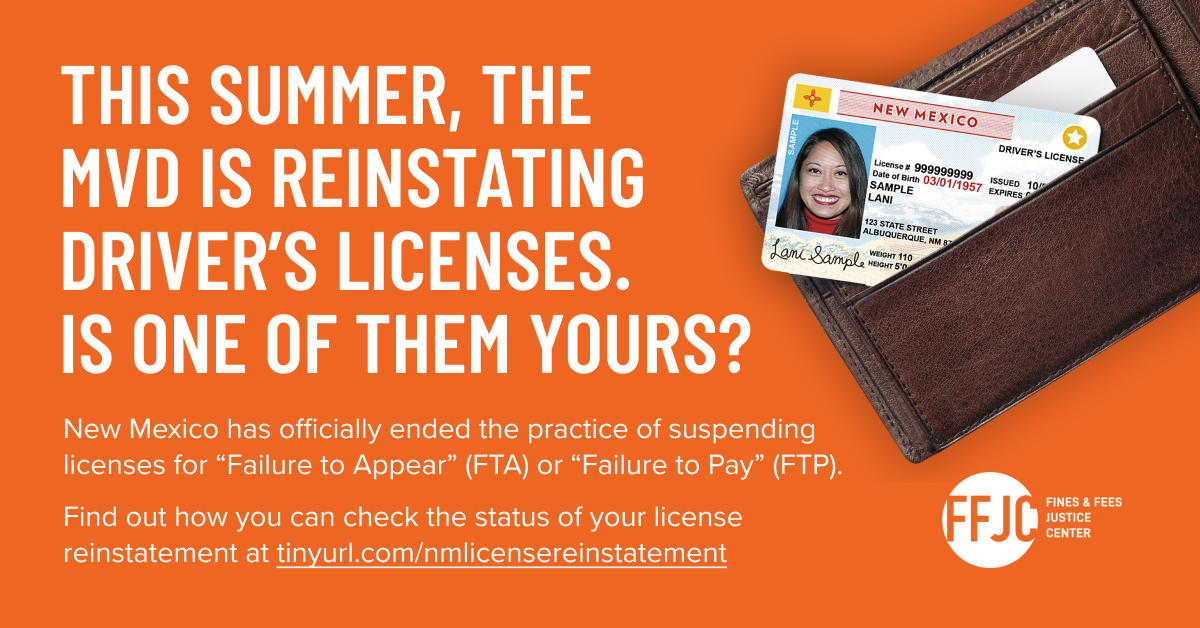New Mexico Becomes 24th State to End Debt-Based License Suspensions
A long-awaited victory arrived for over 300,000 New Mexicans who had previously lost their freedom to drive due to the state’s counterproductive suspension practices. Signed into law on March 15th, SB 47 ends driver’s license suspension for missed court hearings and overdue fines and fees payments owed in traffic and criminal cases; and directs the Motor Vehicle Division to reinstate all outstanding driver’s license suspensions for these reasons. Read more about the new law here.
New Mexico Gov. Lujan Grisham Signs Groundbreaking Fee Elimination Bill Into Law
On April 5, Governor Michelle Lujan Grisham signed HB 139 into law, which eliminates post-adjudication and bench warrant fees. Sponsored by Representative Micaela Lara Cadena of Mesilla, this new law secured bipartisan support as part of an effort led by the New Mexico Judiciary, Administrative Office of the Courts and advocates to realign court priorities and practices. FFJC’s New Mexico State Director, Monica Ault, a seasoned leader of fines and fees reform efforts in the state, noted “when courts have to put so much emphasis on revenue collection, it undermines our people’s trust in the courts…“this law reaffirms the role of our courts as arbiters of the law, not bill collectors.” Read more.
Court debt is trapping thousands of New Mexicans in a cycle of poverty
Across New Mexico, courts impose fines as a punishment for minor traffic and municipal code violations, misdemeanors and felonies. Fees are extra costs that the government attaches to every conviction — even traffic tickets and minor infractions. New Mexicans are typically required to pay fees on top of a fine, restitution or other financial penalties. These fees exist only to raise money for state and local governments and often total hundreds of dollars.
If you’re not able to pay the cost of fines and fees, you risk piling on more fees, losing your driver’s license and, in many cases, being arrested and jailed. Thousands of New Mexicans are trapped in the justice system just because they cannot afford to pay fines and fees. The result is an endless cycle of debt and poverty — where you can lose your job, your home, and even the ability to care for your children.
Imposing fees is correlated with higher recidivism rates and declines in overall public safety. Millions of dollars in fees go uncollected around the state — making them poor bases for court budgeting — and studies show that the cost of collections can outpace the revenue generated. In her “State of the Judiciary” speech, New Mexico Chief Justice Bacon announced the state judiciary’s support for fee elimination, noting that the elimination of fees “is a national best practice which promotes budget transparency and eliminates the practice of paying for government functions on the backs of those that can least afford it.”
New FFJC survey uncovers the true cost of fines and fees on New Mexicans
FFJC took a mixed-methods research approach to understand the burden of fines and fees on economically vulnerable New Mexicans. FFJC’s New Mexico office, in partnership with the New Mexico Advisory Board on Fines and Fees and ACLU New Mexico, administered a state-wide survey to gather data on New Mexicans’ experiences with court debt and the state’s criminal fine and fee system.
Through survey findings and conversations with 511 respondents, FFJC aimed to answer the following questions:
- How much court debt do system-involved New Mexicans have?
- What are the impacts of court debt in New Mexico?
- Are particular communities disproportionately impacted by court debt in New Mexico?
Read and download the report here.
Recent Victories
Governor Michelle Lujan Grisham signs bill to eliminate parole supervision fees
On April 7, 2025, Governor Michelle Lujan Grisham signed SB 375. By eliminating parole fees statewide, this new law removes unnecessary financial barriers to reintegration, reduces recidivism, and helps families prioritize basic needs. Read more.
Governor Michelle Lujan Grisham signs two key reform bills into law
In the 2023 session, Governor Michelle Lujan Grisham signed HB 139, which eliminates post-adjudication and bench warrant fees and SB 47, which ends driver’s license suspension for missed court hearings and overdue fines and fees payments owed in traffic and criminal cases; and directs the Motor Vehicle Division to reinstate all outstanding driver’s license suspensions for these reasons.
Santa Fe City Council Approves Ordinance Limiting Debt-Based Driver’s License Suspensions
The Santa Fe City Council unanimously approved a new ordinance Wednesday night that limits the widespread practice of suspending driver’s licenses when residents can’t afford to immediately pay a fine or fee. Read more.
Governor Michelle Lujan Grisham signs bill to end juvenile fines and fees
On March 15th, New Mexico Gov. Lujan Grisham signed HB 183 into law, which ends the practice of charging administrative fines and fees to children involved in the juvenile justice system. Sponsored by Representatives Roger Montoya and Gail Chasey, the Juvenile Fines and Fees Reform Act will remove fines and administrative fees from the Delinquency Act within the Children’s Code and eliminate the $10 application fee for a public defender in Children’s Court. Read our statement.
Meet New Mexico’s Advisory Board on Fines and Fees
Comprehensive reform initiatives require the type of expertise that can only come from direct experience with New Mexico’s courts, communities, and way of life. In addition to our staff on the ground in New Mexico, FFJC uses models of reform which place those directly impacted by fines and fees policies within a central advisory role.
FFJC’s advisory board model is more than just a means of prioritizing New Mexican voices within reform. It also serves as an incubator for budding advocates who are perfectly positioned to continue the work of fines and fees reform within their community. Our goal is to enable further systemic change by redistributing advocacy skills and expertise to communities starting with the advocates on our board.
Join us.
The Fines and Fees Justice Center’s (FFJC) New Mexico state campaign is the state’s first sustained effort to reform harmful fines and fees. FFJC New Mexico is building broad-based coalitions from across the political spectrum including people who have experienced the criminal justice system, grassroots organizations, judges, public defenders, prosecutors, legislators, law enforcement, and faith-based and advocacy organizations. To learn more about FFJC’s New Mexico work, contact Monica Ault, New Mexico State Director, at [email protected].
Stay informed
Follow us on Facebook and Twitter — and sign up for FFJC’s monthly newsletter.
Advocacy Resources
Press Release: New Mexico Gov. Lujan Grisham Signs Parole Fee Elimination Bill Into Law
2023 Interim Survey Results: The Impact of New Mexico’s Fines and Fees
Op-Ed: Santa Fe leads way to keep New Mexicans Driving
Op-Ed: City’s fixing broken driver’s license — now the state needs to act
New Mexico Suspension Data 2019-2021 Infographic PDF


